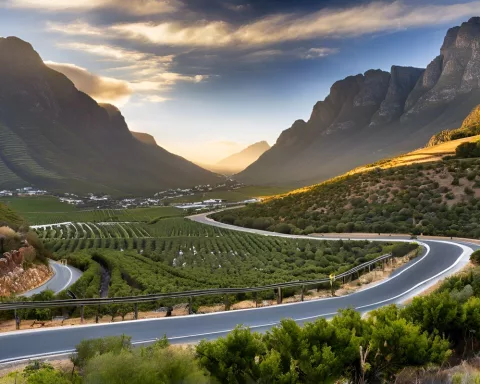South Africa has set ambitious climate objectives for 2030, including realizing net-zero carbon emissions by 2050. A recent report by the Presidential Climate Commission highlights the need for a significant increase in climate financing, with public and private climate investments needing to rise threefold to fivefold from the current average of R131-billion. The report also analyzes investments made from 2019 to 2021, with 79% of funding directed towards clean energy, and the remainder toward low-carbon transportation, water, circular economy, and sustainable agriculture. The recently approved Climate Change Bill and the PCC’s report signal South Africa’s commitment to achieving a sustainable and low-carbon future.
What are South Africa’s climate objectives for 2030?
South Africa aims to realize net-zero carbon emissions by 2050 and has set significant climate financing goals for 2030. The nation’s public and private climate investments must rise threefold to fivefold from the current yearly average of R131-billion. To adhere to the climate targets established in the Paris Agreement, an astounding R535-billion annually is required. A recent report by the Presidential Climate Commission analyzes investments made from 2019 to 2021 to chart the capital catalyzing the transition towards a low-carbon economy.
In its audacious climate objectives set for 2030, South Africa has recognized the need for a significant surge in climate financing, as revealed in a recent report by the Presidential Climate Commission (PCC). The report stipulates that the nation’s public and private climate investments must rise threefold to fivefold from the current yearly average of R131-billion. The goals are staggering: to realize net-zero carbon emissions by 2050, the nation must invest about R334-billion per year, and an astounding R535-billion annually is required to adhere to the climate targets established in the Paris Agreement of 2016.
Tracing the Investment Trends
The report follows and analyzes the investments made from 2019 to 2021, aiming to chart the capital intended to catalyze the transition towards a low-carbon economy and boost resilience against existing and forthcoming climate change. Approximately 79% of the financing was channeled into clean energy, and the remaining funds were disseminated across low-carbon transportation, water, circular economy (encompassing recycling), and sustainable agriculture. Notably, the majority of the climate financing was mobilized via debt.
“The South African Climate Finance Landscape 2023,” as the report is titled, was composed for the PCC by the Climate Policy Initiative (CPI) and GreenCape. The PCC, a commission initiated and chaired by President Cyril Ramaphosa, supervises South Africa’s “just transition” to a low-carbon economy.
Aligning Legislation with Climate Goals
The publication of the report aligns with the recent approval of the Climate Change Bill by the National Assembly. The Bill, which is currently under discussion in the National Council of Provinces and soon to be enacted into law, allocates the accountability of evaluating climate change-related risks and devising plans to mitigate them to municipalities and provinces.
Additionally, the Climate Change Bill opens the pathway for legislations on greenhouse gas emissions and carbon budgets, defining the PCC as a legal entity. Carbon budgets, which are set by the Department of Forestry, Fisheries, and the Environment (DFFE) for each emitter, are a significant part of the Bill.
The Concept of ‘Just Transition’ and Criticisms
In the aftermath of the Bill’s announcement, the Centre for Environmental Rights (CER) issued a statement, hinting that this would be the pioneering legislation to define a ‘just transition.’ This concept implies that the social and economic costs resulting from decarbonizing the economy and society should not be borne by vulnerable workers and communities.
Despite being groundbreaking, the draft has not escaped scrutiny. Critics like Brandon Abdinor, a Climate Advocacy Lawyer at the CER, expressed apprehensions about the absence of penalties for emitters who neglected their greenhouse gas mitigation plans. Robyn Hugo, the head of climate change engagement at Just Share, echoed these concerns, stressing the necessity for “serious consequences for non-compliance” with carbon budgets by major emitters.
South Africa’s two most eminent emitters, Eskom and Sasol, have expressed their support for the Climate Change Bill. In response to these critiques, the DFFE stated that matters concerning penalties for non-compliance would be handled using the Carbon Tax Act and the carbon budget regulations.
The Road Ahead
South Africa’s path towards achieving its climate goals is a colossal endeavor, necessitating escalated funding, strategic planning, and stringent enforcement of regulations. With the recently approved Climate Change Bill and the PCC’s report, the nation has commenced its journey towards a future of sustainable growth and resilience.
What is the Presidential Climate Commission, and what is its role in South Africa’s climate strategy?
The Presidential Climate Commission (PCC) is a commission initiated and chaired by President Cyril Ramaphosa that supervises South Africa’s “just transition” to a low-carbon economy. Its role is to oversee the implementation of the country’s climate policy and ensure that it aligns with the nation’s climate objectives.
What sectors received the most climate financing in South Africa?
Approximately 79% of the climate financing in South Africa was directed towards clean energy, with the remainder disseminated across low-carbon transportation, water, circular economy, and sustainable agriculture.
What is the Climate Change Bill, and how does it align with South Africa’s climate goals?
The Climate Change Bill is a piece of legislation currently being discussed in the National Council of Provinces that allocates the accountability of evaluating climate change-related risks and devising plans to mitigate them to municipalities and provinces. This bill opens the pathway for legislations on greenhouse gas emissions and carbon budgets, defining the PCC as a legal entity, and it aligns with South Africa’s climate goals.
What is the concept of ‘just transition,’ and why is it significant in South Africa’s climate strategy?
The concept of ‘just transition’ implies that the social and economic costs resulting from decarbonizing the economy and society should not be borne by vulnerable workers and communities. It is significant in South Africa’s climate strategy as it ensures that the shift towards a low-carbon economy does not disproportionately affect those who are already marginalized.
Who are South Africa’s two most significant emitters, and what is their stance on the Climate Change Bill?
South Africa’s two most significant emitters are Eskom and Sasol. They have expressed their support for the Climate Change Bill.
What are some criticisms of the Climate Change Bill, and how does the government plan to address them?
Critics have expressed apprehensions about the absence of penalties for emitters who neglect their greenhouse gas mitigation plans. The government plans to handle matters concerning penalties for non-compliance using the Carbon Tax Act and the carbon budget regulations.













